全新版大学英语(第二版)综合教程2课文翻译
- 格式:doc
- 大小:312.00 KB
- 文档页数:61
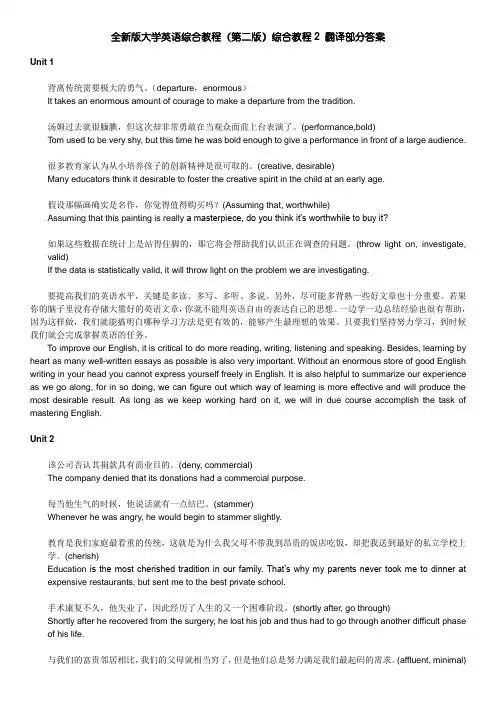
全新版大学英语综合教程(第二版)综合教程2 翻译部分答案Unit 1背离传统需要极大的勇气。
(departure,enormous)It takes an enormous amount of courage to make a departure from the tradition.汤姆过去就很腼腆,但这次却非常勇敢在当观众面前上台表演了。
(performance,bold)Tom used to be very shy, but this time he was bold enough to give a performance in front of a large audience.很多教育家认为从小培养孩子的创新精神是很可取的。
(creative, desirable)Many educators think it desirable to foster the creative spirit in the child at an early age.假设那幅画确实是名作,你觉得值得购买吗?(Assuming that, worthwhile)Assuming that this painting is really a masterpiece, do you think it’s worthwhile to buy it?如果这些数据在统计上是站得住脚的,那它将会帮助我们认识正在调查的问题。
(throw light on, investigate, valid)If the data is statistically valid, it will throw light on the problem we are investigating.要提高我们的英语水平,关键是多读、多写、多听、多说。
另外,尽可能多背熟一些好文章也十分重要。
若果你的脑子里没有存储大量好的英语文章,你就不能用英语自由的表达自己的思想。
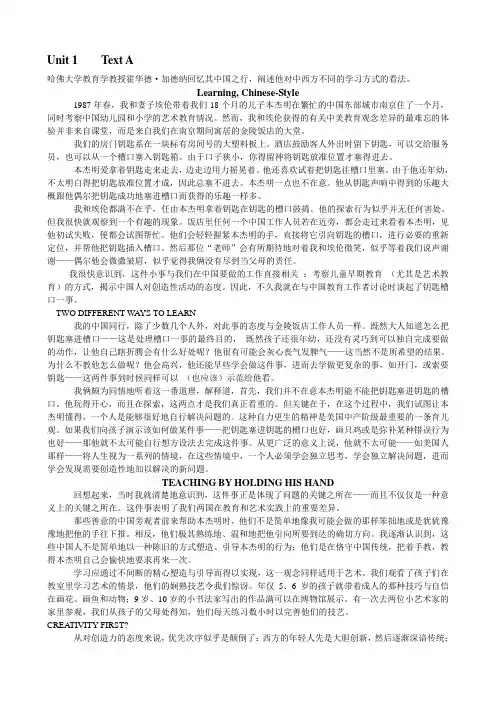
Unit 1 Text A哈佛大学教育学教授霍华德·加德纳回忆其中国之行,阐述他对中西方不同的学习方式的看法。
Learning, Chinese-Style1987年春,我和妻子埃伦带着我们18个月的儿子本杰明在繁忙的中国东部城市南京住了一个月,同时考察中国幼儿园和小学的艺术教育情况。
然而,我和埃伦获得的有关中美教育观念差异的最难忘的体验并非来自课堂,而是来自我们在南京期间寓居的金陵饭店的大堂。
我们的房门钥匙系在一块标有房间号的大塑料板上。
酒店鼓励客人外出时留下钥匙,可以交给服务员,也可以从一个槽口塞入钥匙箱。
由于口子狭小,你得留神将钥匙放准位置才塞得进去。
本杰明爱拿着钥匙走来走去,边走边用力摇晃着。
他还喜欢试着把钥匙往槽口里塞。
由于他还年幼,不太明白得把钥匙放准位置才成,因此总塞不进去。
本杰明一点也不在意。
他从钥匙声响中得到的乐趣大概跟他偶尔把钥匙成功地塞进槽口而获得的乐趣一样多。
我和埃伦都满不在乎,任由本杰明拿着钥匙在钥匙的槽口鼓捣。
他的探索行为似乎并无任何害处。
但我很快就观察到一个有趣的现象。
饭店里任何一个中国工作人员若在近旁,都会走过来看着本杰明,见他初试失败,便都会试图帮忙。
他们会轻轻握紧本杰明的手,直接将它引向钥匙的槽口,进行必要的重新定位,并帮他把钥匙插入槽口。
然后那位“老师”会有所期待地对着我和埃伦微笑,似乎等着我们说声谢谢——偶尔他会微微皱眉,似乎觉得我俩没有尽到当父母的责任。
我很快意识到,这件小事与我们在中国要做的工作直接相关:考察儿童早期教育(尤其是艺术教育)的方式,揭示中国人对创造性活动的态度。
因此,不久我就在与中国教育工作者讨论时谈起了钥匙槽口一事。
TWO DIFFERENT W AYS TO LEARN我的中国同行,除了少数几个人外,对此事的态度与金陵饭店工作人员一样。
既然大人知道怎么把钥匙塞进槽口——这是处理槽口一事的最终目的,既然孩子还很年幼,还没有灵巧到可以独自完成要做的动作,让他自己瞎折腾会有什么好处呢?他很有可能会灰心丧气发脾气——这当然不是所希望的结果。
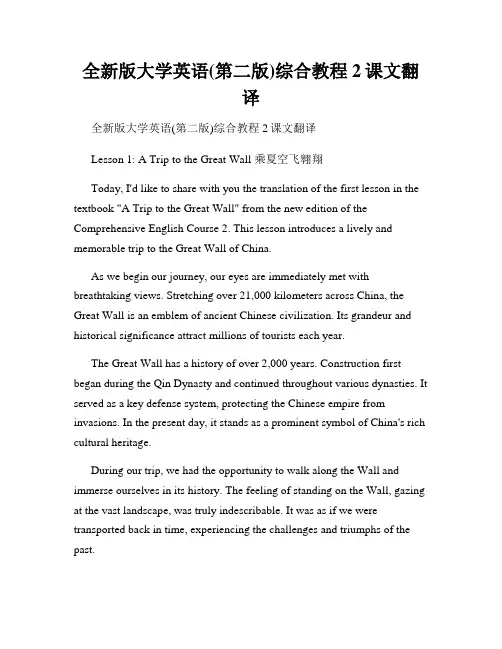
全新版大学英语(第二版)综合教程2课文翻译全新版大学英语(第二版)综合教程2课文翻译Lesson 1: A Trip to the Great Wall 乘夏空飞翱翔Today, I'd like to share with you the translation of the first lesson in the textbook "A Trip to the Great Wall" from the new edition of the Comprehensive English Course 2. This lesson introduces a lively and memorable trip to the Great Wall of China.As we begin our journey, our eyes are immediately met with breathtaking views. Stretching over 21,000 kilometers across China, the Great Wall is an emblem of ancient Chinese civilization. Its grandeur and historical significance attract millions of tourists each year.The Great Wall has a history of over 2,000 years. Construction first began during the Qin Dynasty and continued throughout various dynasties. It served as a key defense system, protecting the Chinese empire from invasions. In the present day, it stands as a prominent symbol of China's rich cultural heritage.During our trip, we had the opportunity to walk along the Wall and immerse ourselves in its history. The feeling of standing on the Wall, gazing at the vast landscape, was truly indescribable. It was as if we were transported back in time, experiencing the challenges and triumphs of the past.The Wall's architectural features are truly remarkable. Its solid structure is built from layers of brick, stone, and other materials, providing stability and strength. Along the Wall, there are watchtowers strategically located to ensure timely communication and defense.Not only is the Great Wall a historical treasure, but it also offers stunning natural scenery. The Wall winds through mountains, valleys, and even deserts, offering breathtaking views at every turn. We were captivated by the beauty of the surrounding landscape, enhancing our overall experience.Furthermore, the Great Wall has become a symbol of unity and perseverance. From the hands of countless laborers who dedicated their lives to its construction, the Wall stands as a testament to human determination and ambition. It serves as a reminder that through unity and hard work, great achievements can be made.In conclusion, our trip to the Great Wall was a truly unforgettable experience. It allowed us to appreciate the historical significance, magnificent architecture, and natural beauty that the Wall embodies. It taught us valuable lessons about the importance of preserving and cherishing our cultural heritage. It is an experience we will cherish for a lifetime.Through the translation of this lesson, we hope to inspire more people to explore and appreciate the rich history and cultural wonders of the Great Wall. Let us continue to celebrate and protect this iconic symbol of China's greatness.。
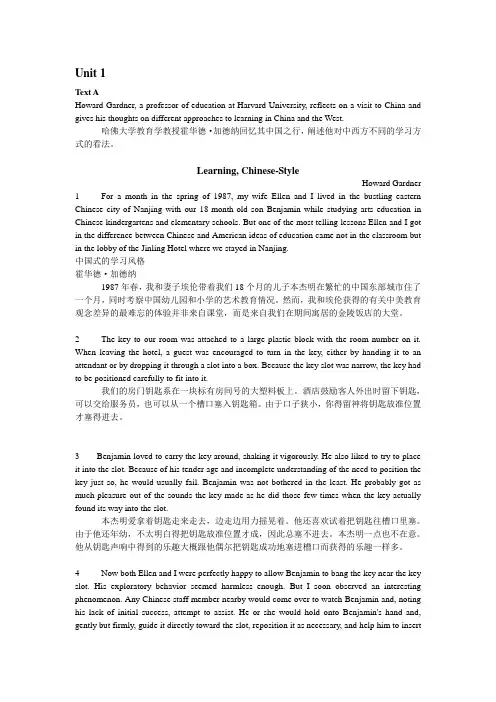
Unit 1Text AHoward Gardner, a professor of education at Harvard University, reflects on a visit to China and gives his thoughts on different approaches to learning in China and the West.哈佛大学教育学教授霍华德·加德纳回忆其中国之行,阐述他对中西方不同的学习方式的看法。
Learning, Chinese-StyleHoward Gardner 1 For a month in the spring of 1987, my wife Ellen and I lived in the bustling eastern Chinese city of Nanjing with our 18-month-old son Benjamin while studying arts education in Chinese kindergartens and elementary schools. But one of the most telling lessons Ellen and I got in the difference between Chinese and American ideas of education came not in the classroom but in the lobby of the Jinling Hotel where we stayed in Nanjing.中国式的学习风格霍华德·加德纳1987年春,我和妻子埃伦带着我们18个月的儿子本杰明在繁忙的中国东部城市住了一个月,同时考察中国幼儿园和小学的艺术教育情况。
然而,我和埃伦获得的有关中美教育观念差异的最难忘的体验并非来自课堂,而是来自我们在期间寓居的金陵饭店的大堂。

![全新版大学英语综合教程2课文原文及翻译[精品文档]](https://uimg.taocdn.com/c48c5a08bdd126fff705cc1755270722192e597c.webp)
全新版大学英语综合教程2课文原文及翻译[精品文档]Unit1One way of summarizing the American position is to state that we value originality and independence more than the Chinese do. The contrast between our two cultures can also be seen in terms of the fears we both harbor. Chinese teachers are fearful that if skills are not acquired early, they may never be acquired; there is, on the other hand, no comparable hurry to promote creativity. American educators fear that unless creativity has been acquired early, it may never emerge; on the other hand, skills can be picked up later.However, I do not want to overstate my case. There is enormous creativity to be found in Chinese scientific, technological and artistic innovations past and present. And there is a danger of exaggerating creative breakthroughs in the West. When any innovation is examined closely, its reliance on previous achievements is all too apparent (the "standing on the shoulders of giants" phenomenon).But assuming that the contrast I have developed is valid, and that the fostering of skills and creativity are both worthwhile goals, the important question becomes this: Can we gather, from the Chinese and American extremes, a superior way to approach education, perhaps striking a better balance between the poles of creativity and basic skills?Unit2Walton set up a college scholarship fund for employees'children, a disaster relief fund to rebuild employee homes damaged by fires, floods, tornadoes, and the like. He believed in cultivating ideas and rewarding success."He'd say, 'That fellow worked hard, let's give him a little extra,'" recalls retired president Ferold F. Arend, who was stunned at such generosity after the stingy employer he left to join Wal-Mart. "I had to change my way of thinking when I came aboard.""The reason for our success," says Walton, in a company handout, "is our people and the way they're treated and the way they feel about their company. They believe things are different here, but they deserve the credit."Adds company lawyer Jim Hendren: "I've never seen anyone yet who worked for him or was around him for any length of time who wasn't better off. And I don't mean just financially, although a lot of people are. It's just something about him -- coming into contact with Sam Walton just makes you a better person."Making the journey from log cabin to White House is part of the American Dream. But when Jimmy Carter was defeated in his attempt to gain a second term as President of the United States he found himself suddenly thrown out of the White House and back in his log cabin. This is how he coped.Unit3SEAN: If that sort of thing happened only once in a while, it wouldn't be so bad. Overall, I wouldn't want to trade my dad for anyone else's. He loves us kids and Mom too. ButI think that's sometimes the problem. He wants to do things for us, things he thinks are good. But he needs to give them more thought because:SEAN, HEIDI and DIANE: (In unison) Father knows better!(The lights quickly fade to black and then come up a second or two later. DIANE stands alone at the Down Right edge of the stage. HEIDI and SEAN enter Down Left and cross to the edge of the stage. )DIANE: Can you imagine how humiliated I was? An honor student, class president. And Father was out asking people to have their sons call and ask me to the prom! But that's dear old dad. Actually, he is a dear. He just doesn't stop to think. And it's not just one of us who've felt the heavy hand of interference. Oh, no, all three of us live in constant dread knowing that at any time disaster can strike because: Father knows better.Unit4I'd never realized how important daily routine is: dressing for work, sleeping normal hours. I'd never thought I relied so much on co-workers for company. I began to understand why long-term unemployment can be so damaging, why life without an externally supported daily plan can leadto higher rates of drug abuse, crime, suicide.To restore balance to my life, I force myself back into the real world. I call people, arrange to meet with the few remaining friends who haven't fled New York City. I try to at least get to the gym, so as to set apart the weekend from the rest of my week. I arrange interviews for stories, doctor's appointments -- anything to get me out of the house and connected with others.But sometimes being face to face is too much. I see a friend and her ringing laughter is intolerable -- the noise of conversation in the restaurant, unbearable. I make my excuses and flee. I re-enter my apartment and run to the computer as though it were a place of safety.I click on the modem, the once-annoying sound of the connection now as pleasant as my favorite tune. I enter my password. The real world disappears.Thought you were safe sharing secrets with Internet friends? Wait for the doorbell...Unit5The runway felt different this time. It startled him for a brief moment. Then it all hit him like a wet bale of hay. The bar was set at nine inches higher than his personal best. That's only one inch off the National record, he thought. The intensity of the moment filled his mind with anxiety. He began shaking the tension. It wasn't working. He became more tense. Why was this happening to him now,he thought. He began to get nervous. Afraid would be a more accurate description. What was he going to do? He had never experienced these feelings. Then out of nowhere, and from the deepest depths of his soul, he pictured his mother. Why now? What was his mother doing in his thoughts at a time like this? It was simple. His mother always used to tell him when you felt tense, anxious or even scared, take deep breaths.So he did. Along with shaking the tension from his legs, he gently laid his pole at his feet. He began to stretch out his arms and upper body. The light breeze that was once there was now gone. He carefully picked up his pole. He felt his heart pounding. He was sure the crowd did, too. The silence was deafening. When he heard the singing of some distant birds in flight, he knew it was his time to fly.Unit6Racing the clock every day is such an exhausting effort that when I actually have a few free moments, I tend to collapse. Mostly I sink into a chair and stare into space while I imagine how lovely life would be if only I possessed the organizational skills and the energy of my superheroines. In fact, I waste a good deal of my spare time just worrying about what other women are accomplishing in theirs. Sometimes I think that these modernfairy tales create as many problems for women as the old stories thathad us biding our time for the day our prince would come.Yet superwomen tales continue to charm me. Despite my friend's warning against being taken in, despite everything I've learned, I find that I'm not only willing, but positively eager to buy that bridge she mentioned. Why? I suppose it has something to do with the appeal of an optimistic approach to life -- and the fact that extraordinary deeds have been accomplished by determined individuals who refused to believe that "you can't" was the final word on their dreams.Men have generally been assured that achieving their heart's desires would be a piece of cake. Women, of course, have always believed that we can't have our cake and eat it too-the old low-dream diet. Perhaps becoming a superwoman is an impossible dream for me, but life without that kind of fantasy is as unappealing as a diet with no treats.1) The young woman described to the policemen the way the man ran up to her and grabbed the bag from her hand.2) All the people working for Sam Walton admire the way he manages Wal-Mart and the way he treats his employees. 3) The neighbors were disgusted at the way he talked to his old father.4) It's amazing the way the eight-year-old boy managed to stay so calm when he faced the emergency.1. You will find yourself penniless in a month.2. He found himself lying in a hospital ward.3. She found herself faced with the toughest job she had ever taken.。
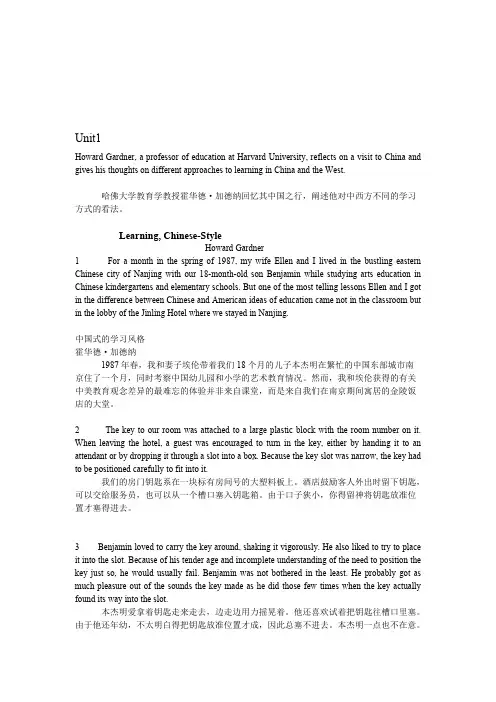
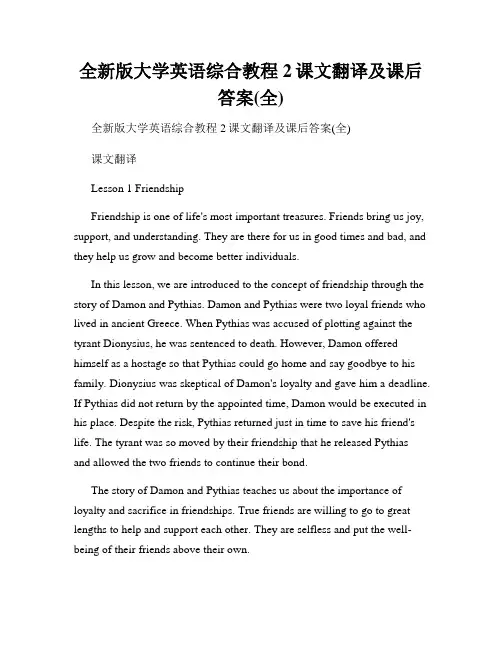
全新版大学英语综合教程2课文翻译及课后答案(全)全新版大学英语综合教程2课文翻译及课后答案(全)课文翻译Lesson 1 FriendshipFriendship is one of life's most important treasures. Friends bring us joy, support, and understanding. They are there for us in good times and bad, and they help us grow and become better individuals.In this lesson, we are introduced to the concept of friendship through the story of Damon and Pythias. Damon and Pythias were two loyal friends who lived in ancient Greece. When Pythias was accused of plotting against the tyrant Dionysius, he was sentenced to death. However, Damon offered himself as a hostage so that Pythias could go home and say goodbye to his family. Dionysius was skeptical of Damon's loyalty and gave him a deadline. If Pythias did not return by the appointed time, Damon would be executed in his place. Despite the risk, Pythias returned just in time to save his friend's life. The tyrant was so moved by their friendship that he released Pythias and allowed the two friends to continue their bond.The story of Damon and Pythias teaches us about the importance of loyalty and sacrifice in friendships. True friends are willing to go to great lengths to help and support each other. They are selfless and put the well-being of their friends above their own.Friendship is not only based on loyalty and sacrifice but also on trust and understanding. Friends should be able to confide in each other and know that their secrets are safe. They should also be able to communicate openly and honestly, even when it's difficult. When trust and understanding exist within a friendship, it becomes a safe haven where individuals can be themselves without fear of judgment.Lesson 2 SuccessSuccess means different things to different people. For some, success is measured by wealth and material possessions. For others, success is achieving personal goals and finding fulfillment in life.This lesson introduces us to the story of Jack and the Beanstalk. Jack, a poor boy, was given magic beans in exchange for his family's cow. These beans grew into a giant beanstalk that reached the sky. Jack bravely climbed the beanstalk and discovered a giant's castle where he found treasures and riches beyond imagination. Jack's journey represents the pursuit of success and the willingness to take risks.Success requires determination, hard work, and a positive mindset. It involves setting goals and working tirelessly to achieve them. Along the way, there may be obstacles and setbacks, but successful individuals persevere and stay focused on their objectives.Success is not solely measured by material wealth but also by personal growth and self-fulfillment. It's about finding happiness and contentment in one's achievements and embracing the journey rather than just the destination.课后答案Lesson 1 Friendship1. What is one of life's most important treasures?- Friendship.2. What do friends bring us?- Joy, support, and understanding.3. Who were Damon and Pythias?- They were two loyal friends who lived in ancient Greece.4. What happened to Pythias?- He was accused of plotting against the tyrant Dionysius and was sentenced to death.5. What did Damon do to help Pythias?- Damon offered himself as a hostage so that Pythias could go home and say goodbye to his family.6. What did Dionysius do to test Damon's loyalty?- He gave Damon a deadline. If Pythias did not return by the appointed time, Damon would be executed in his place.7. Did Pythias return in time?- Yes, Pythias returned just in time to save his friend's life.8. How did the tyrant react to Damon and Pythias' friendship?- The tyrant was moved by their friendship and released Pythias, allowing the two friends to continue their bond.Lesson 2 Success1. How do different people define success?- Different people define success in different ways. For some, it's measured by wealth and material possessions. For others, it's about achieving personal goals and finding fulfillment in life.2. What did Jack receive in exchange for his family's cow?- Jack received magic beans.3. What did the magic beans grow into?- The magic beans grew into a giant beanstalk that reached the sky.4. What did Jack find in the giant's castle?- Jack found treasures and riches beyond imagination in the giant's castle.5. What qualities are required for success?- Determination, hard work, and a positive mindset are required for success.6. What should individuals do when facing obstacles and setbacks?- Successful individuals should persevere and stay focused on their objectives when facing obstacles and setbacks.7. How should success be measured?- Success should not only be measured by material wealth but also by personal growth and self-fulfillment. It's about finding happiness and contentment in one's achievements and embracing the journey.注意:以上仅为翻译示例及课后答案,具体课文内容请参照教材。
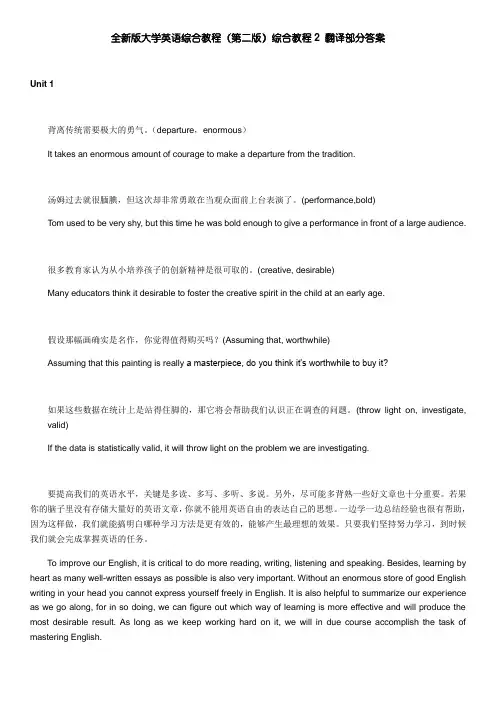
全新版大学英语综合教程(第二版)综合教程2 翻译部分答案Unit 1背离传统需要极大的勇气。
(departure,enormous)It takes an enormous amount of courage to make a departure from the tradition.汤姆过去就很腼腆,但这次却非常勇敢在当观众面前上台表演了。
(performance,bold)Tom used to be very shy, but this time he was bold enough to give a performance in front of a large audience.很多教育家认为从小培养孩子的创新精神是很可取的。
(creative, desirable)Many educators think it desirable to foster the creative spirit in the child at an early age.假设那幅画确实是名作,你觉得值得购买吗?(Assuming that, worthwhile)Assuming that this painting is really a masterpiece, do you think it’s worthwhile to buy it?如果这些数据在统计上是站得住脚的,那它将会帮助我们认识正在调查的问题。
(throw light on, investigate, valid)If the data is statistically valid, it will throw light on the problem we are investigating.要提高我们的英语水平,关键是多读、多写、多听、多说。
另外,尽可能多背熟一些好文章也十分重要。
若果你的脑子里没有存储大量好的英语文章,你就不能用英语自由的表达自己的思想。
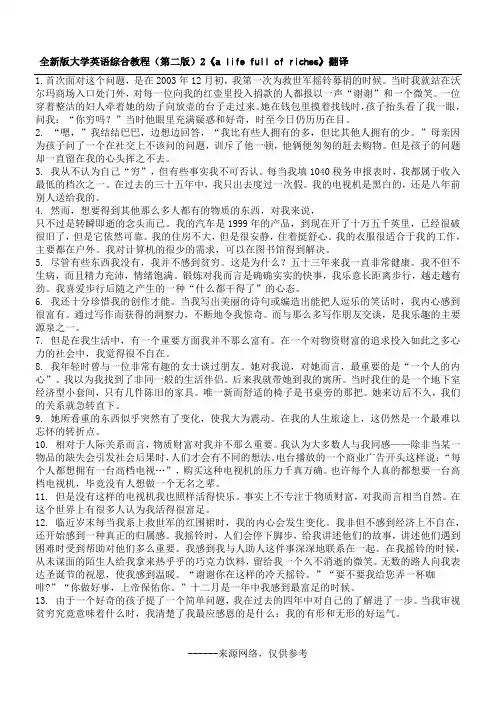
全新版大学英语综合教程(第二版)2《a life full of riches》翻译1.首次面对这个问题,是在2003年12月初,我第一次为救世军摇铃募捐的时候。
当时我就站在沃尔玛商场入口处门外,对每一位向我的红壶里投入捐款的人都报以一声“谢谢”和一个微笑。
一位穿着整洁的妇人牵着她的幼子向放壶的台子走过来。
她在钱包里摸着找钱时,孩子抬头看了我一眼,问我:“你穷吗?”当时他眼里充满疑惑和好奇,时至今日仍历历在目。
2. “嗯,”我结结巴巴,边想边回答,“我比有些人拥有的多,但比其他人拥有的少。
”母亲因为孩子问了一个在社交上不该问的问题,训斥了他一顿,他俩便匆匆的赶去购物。
但是孩子的问题却一直留在我的心头挥之不去。
3. 我从不认为自己“穷”,但有些事实我不可否认。
每当我填1040税务申报表时,我都属于收入最低的档次之一。
在过去的三十五年中,我只出去度过一次假。
我的电视机是黑白的,还是八年前很旧了,5.6.7.8.心”。
我们9.10.“每11. 在12. 临近岁末每当我系上救世军的红围裙时,我的内心会发生变化。
我非但不感到经济上不自在,还开始感到一种真正的归属感。
我摇铃时,人们会停下脚步,给我讲述他们的故事,讲述他们遇到困难时受到帮助对他们多么重要。
我感到我与人助人这件事深深地联系在一起。
在我摇铃的时候,从未谋面的陌生人给我拿来热乎乎的巧克力饮料,留给我一个久不消逝的微笑。
无数的路人向我表达圣诞节的祝愿,使我感到温暖。
“谢谢你在这样的冷天摇铃。
”“要不要我给您弄一杯咖啡?”“你做好事,上帝保佑你。
”十二月是一年中我感到最富足的时候。
13. 由于一个好奇的孩子提了一个简单问题,我在过去的四年中对自己的了解进了一步。
当我审视贫穷究竟意味着什么时,我清楚了我最应感恩的是什么:我的有形和无形的好运气。
------来源网络,仅供参考。
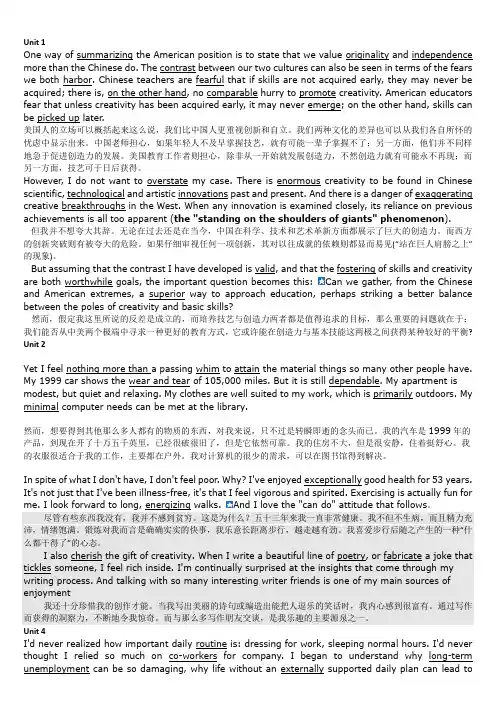
Unit 1One way of summarizing the American position is to state that we value originality and independence more than the Chinese do. The contrast between our two cultures can also be seen in terms of the fears we both harbor. Chinese teachers are fearful that if skills are not acquired early, they may never be acquired; there is, on the other hand, no comparable hurry to promote creativity. American educators fear that unless creativity has been acquired early, it may never emerge; on the other hand, skills can be picked up later.美国人的立场可以概括起来这么说,我们比中国人更重视创新和自立。
我们两种文化的差异也可以从我们各自所怀的忧虑中显示出来。
中国老师担心,如果年轻人不及早掌握技艺,就有可能一辈子掌握不了;另一方面,他们并不同样地急于促进创造力的发展。
美国教育工作者则担心,除非从一开始就发展创造力,不然创造力就有可能永不再现;而另一方面,技艺可于日后获得。
However, I do not want to overstate my case. There is enormous creativity to be found in Chinese scientific, technological and artistic innovations past and present. And there is a danger of exaggerating creative breakthroughs in the West. When any innovation is examined closely, its reliance on previous achievements is all too apparent (the "standing on the shoulders of giants" phenomenon).但我并不想夸大其辞。
Unit 1One way of summarizing the American position is to state that we value originality and independence more than the Chinese do. The contrast between our two cultures can also be seen in terms of the fears we both harbor. Chinese teachers are fearful that if skills are not acquired early, they may never be acquired; there is, on the other hand, no comparable hurry to promote creativity. American educators fear that unless creativity has been acquired early, it may never emerge; on the other hand, skills can be picked up later.美国人的立场可以归纳起来这么说,咱们比中国人更重视创新和自立。
咱们两种文化的不同也可以从咱们各自所怀的忧虑中显示出来。
中国老师担忧,若是年轻人不及早掌握技艺,就有可能一生掌握不了;另一方面,他们并非一样地急于增进创造力的发展。
美国教育工作者则担忧,除非从一开始就发展创造力,不然创造力就有可能永再也不现;而另一方面,技艺可于往后取得。
However, I do not want to overstate my case. There is enormous creativity to be found in Chinese scientific, technological and artistic innovations past and present. And there is a danger of exaggerating creative breakthroughs in the West. When any innovation is examined closely, its reliance on previous achievements is all too apparent (the "standing on the shoulders of giants" phenomenon).但我并非想夸大其辞。
Unit1Howard Gardner, a professor of education at Harvard University, reflects on a visit to China and gives his thoughts on different approaches to learning in China and the West.哈佛大学教育学教授霍华德·加德纳回忆其中国之行,阐述他对中西方不同的学习方式的看法。
Learning, Chinese-StyleHoward Gardner 1 For a month in the spring of 1987, my wife Ellen and I lived in the bustling eastern Chinese city of Nanjing with our 18-month-old son Benjamin while studying arts education in Chinese kindergartens and elementary schools. But one of the most telling lessons Ellen and I got in the difference between Chinese and American ideas of education came not in the classroom but in the lobby of the Jinling Hotel where we stayed in Nanjing.中国式的学习风格霍华德·加德纳1987年春,我和妻子埃伦带着我们18个月的儿子本杰明在繁忙的中国东部城市南京住了一个月,同时考察中国幼儿园和小学的艺术教育情况。
然而,我和埃伦获得的有关中美教育观念差异的最难忘的体验并非来自课堂,而是来自我们在南京期间寓居的金陵饭店的大堂。
Unit 1Text AHoward Gardner, a professor of education at Harvard University, reflects on a visit to China and gives his thoughts on different approaches to learning in China and the West.哈佛大学教育学教授霍华德·加德纳回忆其中国之行,阐述他对中西方不同的学习方式的看法。
Learning, Chinese-StyleHoward Gardner 1 For a month in the spring of 1987, my wife Ellen and I lived in the bustling eastern Chinese city of Nanjing with our 18-month-old son Benjamin while studying arts education in Chinese kindergartens and elementary schools. But one of the most telling lessons Ellen and I got in the difference between Chinese and American ideas of education came not in the classroom but in the lobby of the Jinling Hotel where we stayed in Nanjing.中国式的学习风格霍华德·加德纳1987年春,我和妻子埃伦带着我们18个月的儿子本杰明在繁忙的中国东部城市南京住了一个月,同时考察中国幼儿园和小学的艺术教育情况。
然而,我和埃伦获得的有关中美教育观念差异的最难忘的体验并非来自课堂,而是来自我们在南京期间寓居的金陵饭店的大堂。
Unit1Howard Gardner, a professor of education at Harvard University, reflects on a visit to China and gives his thoughts on different approaches to learning in China and the West.哈佛大学教育学教授霍华德·加德纳回忆其中国之行,阐述他对中西方不同的学习方式的看法。
Learning, Chinese-StyleHoward Gardner 1 For a month in the spring of 1987, my wife Ellen and I lived in the bustling eastern Chinese city of Nanjing with our 18-month-old son Benjamin while studying arts education in Chinese kindergartens and elementary schools. But one of the most telling lessons Ellen and I got in the difference between Chinese and American ideas of education came not in the classroom but in the lobby of the Jinling Hotel where we stayed in Nanjing.中国式的学习风格霍华德·加德纳1987年春,我和妻子埃伦带着我们18个月的儿子本杰明在繁忙的中国东部城市南京住了一个月,同时考察中国幼儿园和小学的艺术教育情况。
然而,我和埃伦获得的有关中美教育观念差异的最难忘的体验并非来自课堂,而是来自我们在南京期间寓居的金陵饭店的大堂。
全新版大学英语第二版综合教程2课文翻译《全新版大学英语第二版综合教程 2》中的课文涵盖了丰富多样的主题和内容,为学习者提供了广泛的语言输入和文化视角。
以下是对部分课文的翻译,希望能对您的学习有所帮助。
课文一:《成长》这篇课文讲述了一个年轻人在成长过程中的经历和感悟。
“当我还是个孩子的时候,世界似乎总是充满了奇迹和神秘。
每一天都是一次新的冒险,每一个角落都隐藏着未知的惊喜。
”“随着年龄的增长,我开始意识到生活并非总是如我所愿。
困难和挫折接踵而至,曾经的梦想似乎变得遥不可及。
”“然而,正是在这些艰难的时刻,我学会了坚持和努力。
我明白了成功并非一蹴而就,而是需要付出持续不断的努力。
”“成长让我懂得了珍惜身边的人和事,也让我更加勇敢地面对未来的挑战。
”课文二:《友谊》“真正的友谊是一种珍贵的财富,它能在我们最需要的时候给予支持和安慰。
”“朋友是那些在你犯错时,不会嘲笑你,而是帮助你改正错误的人。
他们会在你成功时为你欢呼,在你失败时给你鼓励。
”“友谊不是建立在利益和交换之上,而是基于真诚、信任和相互理解。
一个真正的朋友会倾听你的心声,与你分享快乐和悲伤。
”“在这个快节奏的现代社会中,我们常常忙于工作和生活,忽略了与朋友的联系。
但当我们回首往事,会发现真正的友谊是那些经得起时间考验的情感纽带。
”课文三:《文化差异》“不同的国家和民族有着独特的文化,这些文化差异在日常生活的方方面面都有所体现。
”“饮食文化就是一个明显的例子。
在中国,人们喜欢围坐在一张大桌子旁共享美食;而在西方国家,分餐制更为常见。
”“礼仪方面的差异也不容忽视。
在某些文化中,直接的眼神接触被视为尊重;而在另一些文化中,可能会被认为是不礼貌的。
”“理解和尊重文化差异是促进跨文化交流和建立和谐世界的关键。
只有当我们摒弃偏见,以开放的心态去学习和欣赏其他文化时,才能真正实现文化的交融与共同发展。
”课文四:《科技与生活》“科技的飞速发展给我们的生活带来了翻天覆地的变化。
Unit 1Text AHoward Gardner, a professor of education at Harvard University, reflects on a visit to China and gives his thoughts on different approaches to learning in China and the West.哈佛大学教育学教授霍华德·加德纳回忆其中国之行,阐述他对中西方不同的学习方式的看法。
Learning, Chinese-StyleHoward Gardner 1 For a month in the spring of 1987, my wife Ellen and I lived in the bustling eastern Chinese city of Nanjing with our 18-month-old son Benjamin while studying arts education in Chinese kindergartens and elementary schools. But one of the most telling lessons Ellen and I got in the difference between Chinese and American ideas of education came not in the classroom but in the lobby of the Jinling Hotel where we stayed in Nanjing.中国式的学习风格霍华德·加德纳1987年春,我和妻子埃伦带着我们18个月的儿子本杰明在繁忙的中国东部城市南京住了一个月,同时考察中国幼儿园和小学的艺术教育情况。
然而,我和埃伦获得的有关中美教育观念差异的最难忘的体验并非来自课堂,而是来自我们在南京期间寓居的金陵饭店的大堂。
2 The key to our room was attached to a large plastic block with the room number on it. When leaving the hotel, a guest was encouraged to turn in the key, either by handing it to an attendant or by dropping it through a slot into a box. Because the key slot was narrow, the key had to be positioned carefully to fit into it.我们的房门钥匙系在一块标有房间号的大塑料板上。
酒店鼓励客人外出时留下钥匙,可以交给服务员,也可以从一个槽口塞入钥匙箱。
由于口子狭小,你得留神将钥匙放准位置才塞得进去。
3 Benjamin loved to carry the key around, shaking it vigorously. He also liked to try to place it into the slot. Because of his tender age and incomplete understanding of the need to position the key just so, he would usually fail. Benjamin was not bothered in the least. He probably got as much pleasure out of the sounds the key made as he did those few times when the key actually found its way into the slot.本杰明爱拿着钥匙走来走去,边走边用力摇晃着。
他还喜欢试着把钥匙往槽口里塞。
由于他还年幼,不太明白得把钥匙放准位置才成,因此总塞不进去。
本杰明一点也不在意。
他从钥匙声响中得到的乐趣大概跟他偶尔把钥匙成功地塞进槽口而获得的乐趣一样多。
4 Now both Ellen and I were perfectly happy to allow Benjamin to bang the key near the key slot. His exploratory behavior seemed harmless enough. But I soon observed an interesting phenomenon. Any Chinese staff member nearby would come over to watch Benjamin and, noting his lack of initial success, attempt to assist. He or she would hold onto Benjamin's hand and,gently but firmly, guide it directly toward the slot, reposition it as necessary, and help him to insert it. The "teacher" would then smile somewhat expectantly at Ellen or me, as if awaiting a thank you ─and on occasion would frown slightly, as if considering us to be neglecting our parental duties.我和埃伦都满不在乎,任由本杰明拿着钥匙在钥匙的槽口鼓捣。
他的探索行为似乎并无任何害处。
但我很快就观察到一个有趣的现象。
饭店里任何一个中国工作人员若在近旁,都会走过来看着本杰明,见他初试失败,便都会试图帮忙。
他们会轻轻握紧本杰明的手,直接将它引向钥匙的槽口,进行必要的重新定位,并帮他把钥匙插入槽口。
然后那位“老师”会有所期待地对着我和埃伦微笑,似乎等着我们说声谢谢——偶尔他会微微皱眉,似乎觉得我俩没有尽到当父母的责任。
5 I soon realized that this incident was directly relevant to our assigned tasks in China: to investigate the ways of early childhood education (especially in the arts), and to throw light on Chinese attitudes toward creativity. And so before long I began to introduce the key-slot anecdote into my discussions with Chinese educators. 我很快意识到,这件小事与我们在中国要做的工作直接相关:考察儿童早期教育(尤其是艺术教育)的方式,揭示中国人对创造性活动的态度。
因此,不久我就在与中国教育工作者讨论时谈起了钥匙槽口一事。
TWO DIFFERENT W AYS TO LEARN6 With a few exceptions my Chinese colleagues displayed the same attitude as the staff at the Jinling Hotel. Since adults know how to place the key in the key slot, which is the ultimate purpose of approaching the slot, and since the child is neither old enough nor clever enough to realize the desired action on his own, what possible gain is achieved by having him struggle? He may well get frustrated and angry ─certainly not a desirable outcome. Why not show him what to do? He will be happy, he will learn how to accomplish the task sooner, and then he can proceed to more complex activities, like opening the door or asking for the key ─both of which accomplishments can (and should) in due course be modeled for him as well.两种不同的学习方式我的中国同行,除了少数几个人外,对此事的态度与金陵饭店工作人员一样。
既然大人知道怎么把钥匙塞进槽口——这是处理槽口一事的最终目的,既然孩子还很年幼,还没有灵巧到可以独自完成要做的动作,让他自己瞎折腾会有什么好处呢?他很有可能会灰心丧气发脾气——这当然不是所希望的结果。
为什么不教他怎么做呢?他会高兴,他还能早些学会做这件事,进而去学做更复杂的事,如开门,或索要钥匙——这两件事到时候同样可以(也应该)示范给他看。
7 We listened to such explanations sympathetically and explained that, first of all, we did not much care whether Benjamin succeeded in inserting the key into the slot. He was having a good time and was exploring, two activities that did matter to us. But the critical point was that, in the process, we were trying to teach Benjamin that one can solve a problem effectively by oneself. Such self-reliance is a principal value of child rearing in middle-class America. So long as the child is shown exactly how to do something ─whether it be placing a key in a key slot, drawing a hen or making up for a misdeed ─he is less likely to figure out himself how to accomplish such a task. And, more generally, he is less likely to view life ─as Americans do ─as a series of situations in which one has to learn to think for oneself, to solve problems on one's own and even to discover new problems for which creative solutions are wanted.我俩颇为同情地听着这一番道理,解释道,首先,我们并不在意本杰明能不能把钥匙塞进钥匙的槽口。